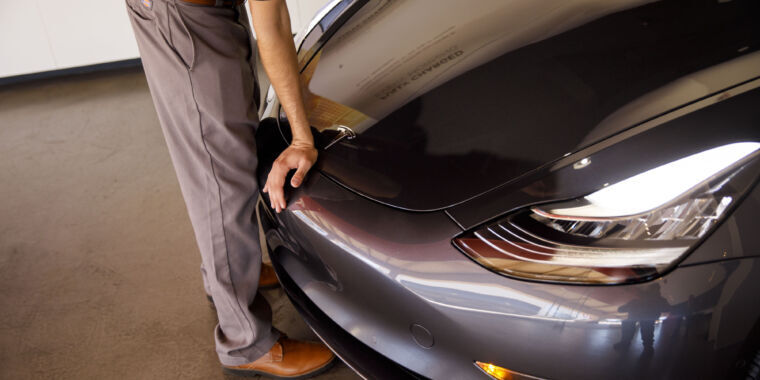The electric car manufacturer Tesla had to issue a massive recall this month to fix faulty hood latches that can open while its cars are driving. The problem affects more than 1.8 million cars, which means it’s slightly smaller than the recall in December that applied to more than 2 million Teslas.
The problem, according to the official National Highway Traffic Safety Administration’s Part 573 safety recall report, affects model year 2021–2024 Model 3s (built between September 21, 2020, and June 2, 2024), model year 2021–2024 Model Ss (built between January 26, 2021, and July 15, 2024), model year 2021–2024 Model Xs (built between August 18, 2021, and July 15, 2024), and model year 2020–2024 Model Ys (built between January 9, 2020, and July 15, 2024).
The problem first became apparent to Tesla in March of this year after complaints about unintended hood opening from Chinese customers. By April, it had identified the problem as deformation of the hood latch switch, “which could prevent the customer from being notified about an open hood state.”
Although the problem is with the hood latch, as with many Tesla safety recalls, the problem can be fixed with an over-the-air software patch. The new software is able to detect if the hood is open and, if so, will display a warning to the driver to alert them to stop their vehicle and secure the hood.



By April, it had identified the problem as deformation of the hood latch switchI mean that says the switch is faulty, sure there ALSO seems to be a problem with the sensor not providing the driver with a warning the frunk isn’t latched, but you can’t fix hardware with an over the air update
The only thing I can think of is if the sensor is a hall effect sensor that detects something (the switch?) being depressed by the hood. The sensitivity of the hall effect sensor might be tuneable. They may be able to reduce the sensitivity so it still detects a properly closed hood, but reports an improperly closed hood as open.
It’s annoying that the report just says it’s fixed in software without explaining how.